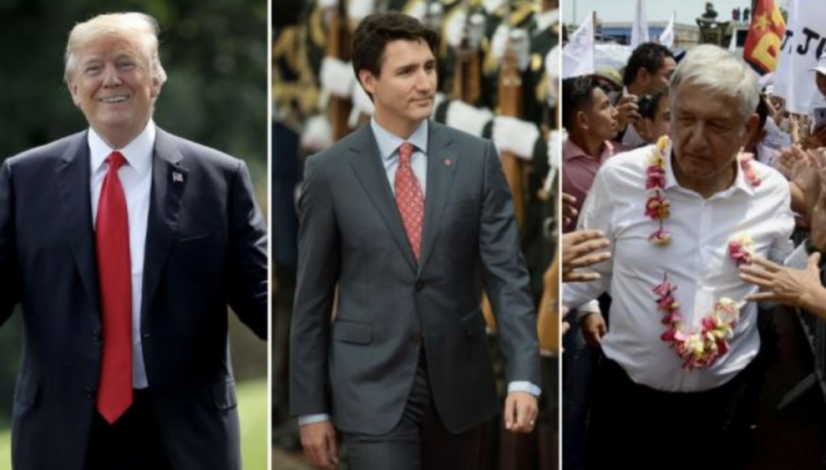New NAFTA deal the win-win-win Trump, Trudeau, Obrador need

President Trump needs a win on trade, and the Mexican election could help him get one. Although Mexico’s new president is not a Trump fan and cannot be seen kowtowing to America’s combative commander in chief, both sides could benefit from quickly resolving the North American Free Trade Agreement (NAFTA) negotiations.
Trump is under increasing pressure to de-escalate the trade battle from supportive groups like farmers and the Chamber of Commerce.
Meanwhile, Andres Manuel Lopez Obrador (AMLO) will not take office until Dec. 1, but his victory was so lopsided that he may well influence policy even as his predecessor is still at the helm.
He has tried to calm jittery investors by pledging central bank independence and spending constraints, but he could send a stronger message by calling for a quick resolution to trade negotiations with the U.S.
He cannot fulfill his promise to improve the lives of Mexico’s poor without the help of foreign investors and the United States. For that, he needs NAFTA.
The initial conversation between the two leaders was respectful. A door was opened.
At the same time, Canadian Prime Minister Justin Trudeau will not want to be left out of the party. He too would benefit from showing that his tough-guy routine is not just a poll booster, but also effective in bringing home the bacon.
Signing a new NAFTA deal? It’s a win-win-win.
President Trump may need convincing. Only recently, he said he was not happy with the NAFTA negotiations and would not sign a new deal before the midterm elections. On the other hand, the booming economy and soaring business optimism are Trump’s greatest assets.
His aggressive posture on trade is beginning to jeopardize the very energy he has created. He needs to show it will bear fruit. Nowhere is a deal more necessary than in North America. Canada and Mexico rank as our top two export markets.
Those retaliating against Trump’s tariffs on aluminum and steel are not stupid. They have targeted products and regions important politically and economically to Republicans.
The Chamber of Commerce just recently weighed in, producing a study showing the impact of Trump’s tariff battles and highlighting the states that stand to lose the most.
The chamber notes that some $75 billion of U.S. exports are now targeted by other nations; they report that, “Half of all U.S. manufacturing jobs depend on exports, and one in three acres of American farmland is planted for international sales.”
The analysis shows that several toss-up states, including Michigan, Wisconsin and Pennsylvania, are among those hardest hit.
There is another and possibly more dangerous chapter yet to be written. That is when consumer prices start to rise more rapidly. The chamber has called tariffs “simply taxes that raise prices for everyone.” It’s a smart refrain; we know how Trump supporters feel about taxes.
But it is also smart in that it links tariffs to rising consumer prices, a trend that has already begun, fed by a tight labor market and rising wages. Inflation has so far been modest, with consumer prices trending only gradually higher.
Still, the consumer price index was up 2.2 percent in May, compared to 1.7 percent a year ago and the biggest jump this year.
If voters begin to be concerned about rising prices and Trump’s opponents pin some of the cost increase on the president’s trade moves, public opinion could quickly sour on his agenda. So far this year, import prices are up 4.3 percent, with fuel costs the major contributor to the increase.
That rise, coming in spite of a year-to-date rise of 8 percent in the trade-weighted value of the dollar, did not include any impact from tariffs. In coming months the impact of those “taxes” will start to boost costs even more.
That cost concern will also motivate Canada and Mexico. Canada has just imposed tariffs on $12.6 billion of U.S. goods like ketchup, chocolate and industrial pipes; those costs will filter through their economy, too.
Though Prime Minister Trudeau got a bump in his approval ratings after his contretemps with Trump at the Group of Seven meetings in June, his prospects are still shaky.
The cliche, “It’s the economy, stupid,” does not attach only to U.S. politics. Trudeau faces elections next year with slowing growth, according to the National Bank of Canada, which recently cut their GDP forecast by two “ticks” — from 2.2 percent to 2.0 percent — because of trade concerns.
If that downtrend continues, Trudeau’s approval ratings will slide as well. The U.S. accounts for more than two-thirds of Canada’s goods exports. Moreover, international trade makes up nearly two-thirds of Canada’s economy, compared to only 27 percent for the U.S.
In Mexico, AMLO’s election caused markets to slide and the peso to drop by more than 1 percent compared to the dollar. Investors are worried the left-wing populist will torch the economy by hiking spending and reversing the privatization of the oil industry.
He will need to build support for his agenda; nothing could be more beneficial than locking down the NAFTA re-write. Like Trump, Obrador may thrive on surprise. This would be a dandy.
President Trump’s trade war (and it is becoming just that) is meant to level the playing field, not world growth. He can and should resolve some of the fights he has picked, especially the one with our NAFTA partners. It is far more important to bring those countries (and the EU) along in his more important confrontation with China.
In trying to stem Beijing’s military and commercial aggression, their theft of intellectual property and unfair trade practices, the U.S. needs all the help it can get.
Published on The Hill




